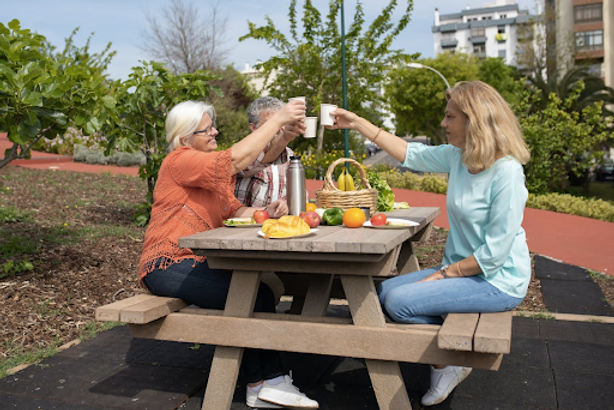The summer months are a wonderful time of the year for people of all ages looking to enjoy outdoor activities and warm weather. Unfortunately, sometimes the weather can become too hot for people to stay comfortable and safe, even if they are indoors. For seniors, it’s important to take precautions when the days get hot, as aging bodies have a harder time regulating body temperature.
When the temperature climbs above 80°F, older adults should take precautions to avoid heat-related illnesses and ensure this time of year is enjoyable. This is even more essential for those with chronic medical conditions and medication routines.
So what are some ways in which seniors can beat the heat during the summer months? Keep reading to learn more!
Stay Well Hydrated
Seniors need to stay hydrated all year long but especially on hot days. This is very important for health and well-being, especially since aging adults can find it harder to recognize when they are thirsty. Drinking a glass of water, juice, or milk with each meal is a great way to ensure hydration is taking place throughout the day. Water can also be consumed when medications are scheduled throughout the day.
Reusable water bottles can make it easier to track water intake regularly. Seniors can also add in foods with high-water content to boost their hydration levels. For example, this extra hydration could come from foods like celery, watermelon, oranges, or lettuce.
Keeping a Cool Home

Making sure their home is cool and comfortable is essential for seniors looking to beat the heat. Air conditioners are a great way to ensure an ideal temperature within the home on hot days. For seniors without air conditioners, it is possible to create cross ventilation by opening windows and using fans in strategic ways. When the sun is at its brightest, close curtains or blinds to block out direct sunlight. Reflective film and light-colored curtains are also beneficial in keeping indoor temperatures low.
Avoid Peak Heat
When looking to avoid high temperatures, it can be a good idea to stay indoors between 10 am and 4 pm. The sun is at its strongest during these hours, so it’s best to plan outdoor activities before or after this period. For example, outdoor workouts or scheduled outings could be planned in the early morning or later in the evening once temperatures have cooled down. If you do have to be outside during peak heat hours, stay in the shade as much as possible, drink water, and dress in light and loose clothing.
Protect Skin from Sun Exposure

When seniors do find themselves outdoors, they must take precautions to protect their skin from getting damaged or burned. Thankfully, this can be done quite easily by utilizing sunscreen and appropriate clothing. Choose a broad-spectrum sunscreen lotion with SPF 30 or higher and apply it liberally to all exposed skin. When choosing an outfit, seniors will benefit from wearing loose, light-colored clothes that help repel heat. Wearing a wide-brimmed hat and sunglasses can also help greatly in staying cool and protecting the eyes from sun damage.
Recognize Signs of Heat-Related Illnesses
As much as we want to avoid heat-related illnesses, we must also be able to recognize signs of trouble. For example, an older adult may be dehydrated if they start to get headaches, dizziness, muscle cramps, or dry mouth. Seniors can also fall victim to heat strokes when their bodies heat up faster than they can cool down. Heat strokes are medical emergencies and can cause high body temperatures (103° F or higher), confusion, loss of consciousness, and hot skin. Heat exhaustion can occur due to exposure to high temperatures and result in heavy sweating, cold clammy skin, nausea and vomiting, or fainting.
Conclusion

In conclusion, there are many great ways for seniors to beat the heat during hot summer days. Doing so can help ensure fun, safe, and comfortable experiences during this time of year. Staying hydrated, avoiding peak sun hours, and keeping a cool home environment are all essential for seniors looking to stay cool on hot days. To protect their skin, seniors should also use sunscreen and wear protective clothing when directly exposed to the sun’s rays. Finally, seniors and their loved ones should stay on the lookout for signs of heat-related illnesses and dehydration. Doing so can help prevent serious health problems and keep seniors safe at all times.


Leave a Reply